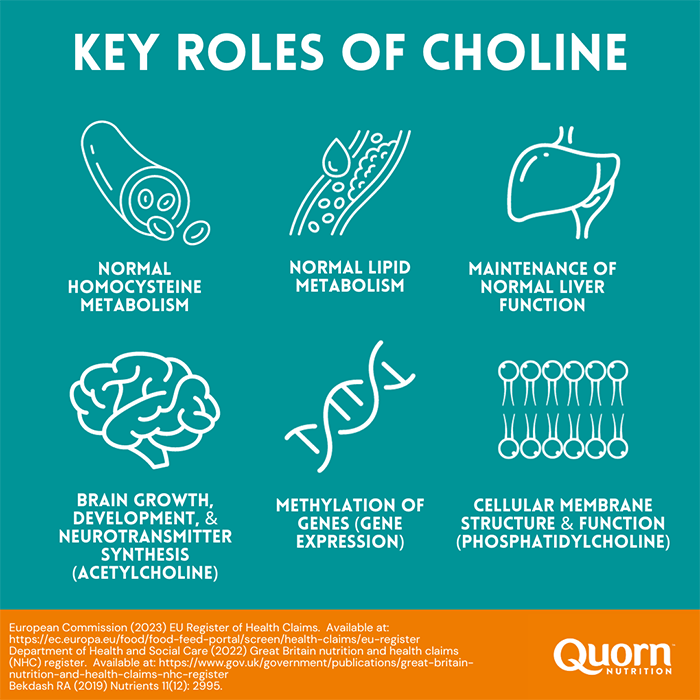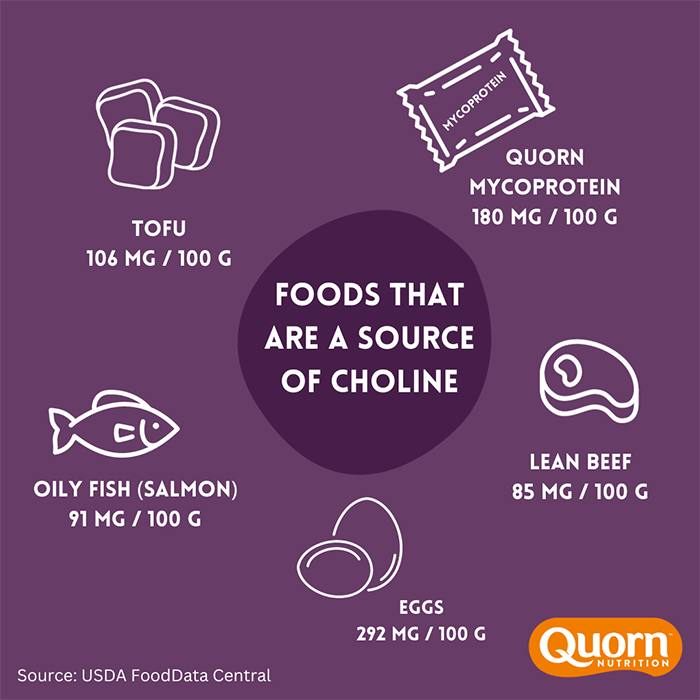Choline – The Lesser-Known Essential Nutrient
Written by Veronica Moran (Food Science and Nutrition Undergraduate Student at the University of Leeds) and Dr Emma Derbyshire (Director of Nutritional Insight Ltd).

Have you ever heard of choline? If not, that’s understandable since this lesser-known micronutrient is not presently included in UK dietary guidelines, food composition databases, or dietary surveys1. This isn’t the case everywhere, for example, the United States2 and Norway3 have choline recommendations.
What is Choline?
Choline is an essential nutrient which is required for neurotransmitter synthesis (acetylcholine) and has physiological roles in the human body across the lifecycle4. Although not a true vitamin, it’s often grouped in the B-vitamin family. It can be produced in the liver, but only in very small amounts which are not high enough to fuel the bodies physiological demands and requirements can also depend on a genetic variants in genes5. Therefore, it is important to consume choline from the diet.
What Does Choline Do?
Choline performs a wide variety of functions in the body. Several health claims have been authorised for choline which include that choline contributes to normal lipid metabolism, normal homocysteine metabolism and the maintenance of normal liver function6,7.
These are some of the key roles of choline:
-
Normal homocysteine metabolism6,7
-
Normal lipid metabolism6,7
-
Maintenance of normal liver function6,7
-
Brain growth, development, and neurotransmitter synthesis (acetylcholine)8
-
Methylation of genes (gene expression)8
-
Cellular membrane structure and function (phosphatidylcholine)8

Pregnancy and Early Development
Choline is exceptionally important during the first 1,000 days of life (conception to 2 years) as there is growing evidence that it could help to facilitate normal brain development during this life stage when demands for choline are high9. For example, tissue expansion, the synthesis of new membranes, gene expression, neurotransmission and brain development are all working overtime during this life stage10!
Early work11 suggested that choline can modify the foetus’ brain and spinal cord structure (through apoptosis and stem cell proliferation) influencing the risk of neural tube defects and memory function. Several decades on a gold-standard meta-analysis paper has shown that lower maternal choline intakes/blood levels were associated with a higher odds ratio (a measure of association between an exposure and outcome) for neural tube defects12. There is also growing evidence that maternal choline supplementation could lesson cognitive and affective dysfunction when taken by mothers carrying a foetus with Down syndrome13.
During lactation, intake of choline and genetics influence the choline concentrations in human breast milk, which can affect the amount of choline the baby will receive14. Human neonates are also born with choline blood levels around three times higher than maternal levels, indicating high demands during this life stage.15
Liver Function
One of the key roles of choline is the maintenance of normal liver function. The recently updated 2023 Nordic Nutrition Recommendations conclude that a choline-free diet can result in liver damage (corrected by giving 500 mg choline/d)3.
How Much Choline Do We Need?
The amount of choline we need ranges from 140 – 520 mg/d depending on our life stage, and Table 1 shows the Dietary Reference Values set for choline by the European Food Safety Authority (EFSA).
Table 1: EFSA Dietary Reference Values for Choline16.
| Life Stage | Amount (mg/d) |
|---|---|
| Infants (7-11 months) | 160 |
| Children (1-14 years) | 140 - 340 mg |
| Teenagers (15-17 years) | 400 |
| Pregnant women | 480 |
| Lactating women | 520 |
| Adult males and non-pregnant females | 400 |
The recently updated 2023 Nordic Nutrition Recommendations also include and report on choline. They specify that pregnant and lactating women and children are more likely to be vulnerable to deficiencies3. They report that there is insufficient data to derive an Upper Limit (UL)3.
Choline Intakes
Several publications have looked at choline intakes across the lifecycle. In the United States choline intakes have found to be associated with levels of egg and protein consumption (meat, seafood and poultry) with egg consumers having higher choline intakes compared with non-consumers (525 versus 294 mg/d)17. Derbyshire et al. (2021)18 reviewed evidence from 26 publications focused on the childbearing years (preconception, pregnancy, and lactation) finding that average choline intake ranged from 233 mg/day to 383 mg/day and were lower than recommended. Choline intakes are not presently collected in the UK National Diet and Nutrition Survey.
Sources of Choline
Choline can be found in a variety of foods as shown in Table 2. Although many animal sources are typically considered the highest source, Quorn’s mycoprotein provides a comparable fungi-based source of choline as shown in this infographic.
| Food | Choline content (mg/100g) | Choline (per portion) |
|---|---|---|
| Eggs, hard-boiled | 292 | 175.2 (60g) |
| Quorn Mycoprotein | 180 | 158.4 (in 100g Quorn mince) |
| Oily fish (salmon) | 90.5 | 108.5 (120g) |
| Lean chicken | 78.8 | 94.6 (120g) |
| Tofu, fried | 106 | 84.8 (80g) |
| Lean beef | 84.9 | 76.4 (90g) |
| Baked beans, canned | 30.8 | 61.6 (200g) |
| Quinoa, cooked | 23 | 34.5 (150g) |
| Broccoli, boiled without salt | 40.1 | 32.8 (80g) |
| Brussels sprouts, boiled without salt | 40.6 | 32.5 (80g) |
| Cauliflower, boiled without salt | 39.1 | 31.3 (80g) |
| Mushrooms, white, stir fried | 21.9 | 17.5 (80g) |
| Spinach, raw | 19.3 | 15.4 (80g) |
| Peanuts, raw | 52.5 | 10.5 (20g) |
Source: USDA FoodData Central. Available at: https://fdc.nal.usda.gov/

Summary
Choline has been overlooked as a micronutrient but evidence in the field of choline and health is building. We have seen how choline has important roles across the life cycle, especially pregnancy when requirements increase. It can be found in many foods and QuornTM (mycoprotein) is one of these.
References
1 Derbyshire E (2019) Could we be overlooking a potential choline crisis in the United Kingdom? BMJ Nutr Prev Health 2(2): 86-89.
2 Institute of Medicine (1998) Food and Nutrition Board. Dietary Reference Intakes: Thiamin, Riboflavin, Niacin, Vitamin B6, Folate, Vitamin B12, Pantothenic Acid, Biotin, and Choline. Washington, DC: National Academy Press.
3 Nordic Co-Operation (2023) Nordic Nutrition Recommendations 2023 Integrating Environmental Aspects. Available at: Nordic Nutrition Recommendations 2023 Integrating Environmental Aspects.
4 Wiedeman AM et al. (2018) Dietary Choline Intake: Current State of Knowledge Across the Life Cycle. Nutrients 10(10): 1513.
5 Wallace TC et al. (2020) Choline: The Neurocognitive Essential Nutrient of Interest to Obstetricians and Gynecologists. J Diet Suppl 17(6):733-752.
6 European Commission (2023) EU Register of Health Claims. Available at: https://ec.europa.eu/food/food-feed-portal/screen/health-claims/eu-register
7 Department of Health and Social Care (2022) Great Britain nutrition and health claims (NHC) register. Available at: https://www.gov.uk/government/publications/great-britain-nutrition-and-health-claims-nhc-register
8 Bekdash RA (2019) Neuroprotective Effects of Choline and Other Methyl Donors. Nutrients 11(12): 2995.
9 Derbyshire E & Obeid R (2020) Choline, Neurological Development and Brain Function: A Systematic Review Focusing on the First 1000 Days. Nutrients 12(6): 1731.
10 Korsmo HW et al. (2019) Choline: Exploring the Growing Science on Its Benefits for Moms and Babies. Nutrients 11(8):1823.
11 Zeisel SH (2006). Choline: Critical Role During Fetal Development and Dietary Requirements in Adults. Annual Review of Nutrition26(1):229–250.
12 Obeid R et al. (2022) Association between Maternal Choline, Fetal Brain Development, and Child Neurocognition: Systematic Review and Meta-Analysis of Human Studies. Adv Nutr 13(6):2445-2457.
13 Powers BE et al. (2021) Maternal Choline Supplementation as a Potential Therapy for Down Syndrome: Assessment of Effects Throughout the Lifespan. Front Aging Neurosci 13:723046.
14 Fischer LM et al. (2010) Choline intake and genetic polymorphisms influence choline metabolite concentrations in human breast milk and plasma. Am J Clin Nutr 92(2):336-46.
15 Caudill MA (2010) Pre- and postnatal health: evidence of increased choline needs. J Am Diet Assoc 110(8):1198-206.
16 European Food Safety Authority (2016) Dietary Reference Values for Choline. EFSA Journal 14(8):4484.
17 Wallace TC & Fulgoni VL (2017) Usual Choline Intakes Are Associated with Egg and Protein Food Consumption in the United States. 9(8): 839.
18 Derbyshire E et al. (2021) Habitual Choline Intakes across the Childbearing Years: A Review. Nutrients 13(12): 4390.